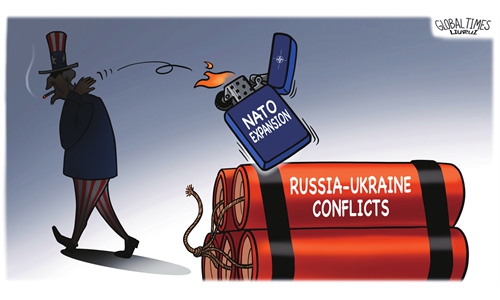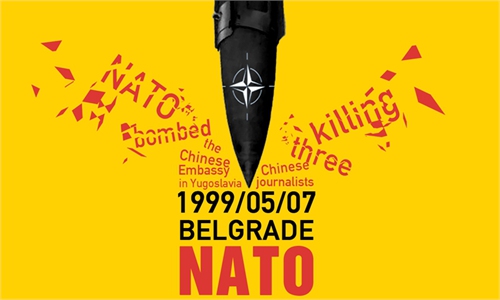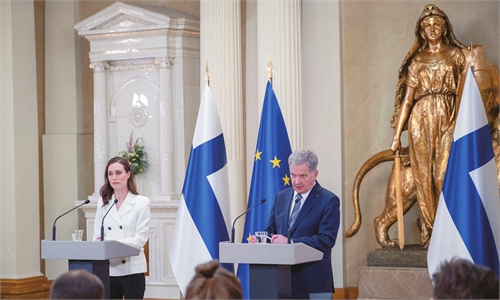Editor's Note:
The hysteria toward China has risen to a new peak in the US. Political climate in Washington is increasingly weird in terms of China-related topics. Why is there so much irrationality on China in the US? How to view China-US relations from a constructive perspective? The Global Times (GT) interviewed several Chinese and American observers on these topics.
Zheng Yongnian (Zheng), professor at the Chinese University of Hong Kong, Shenzhen, and president of the Institute for International Affairs, Qianhai, believes that the collective panic of the US toward China has led to US' irrational China policy. When there were a lot of domestic problems, it would divert its conflicts to international relations. This is the fifth, and also the final interview, in the series.
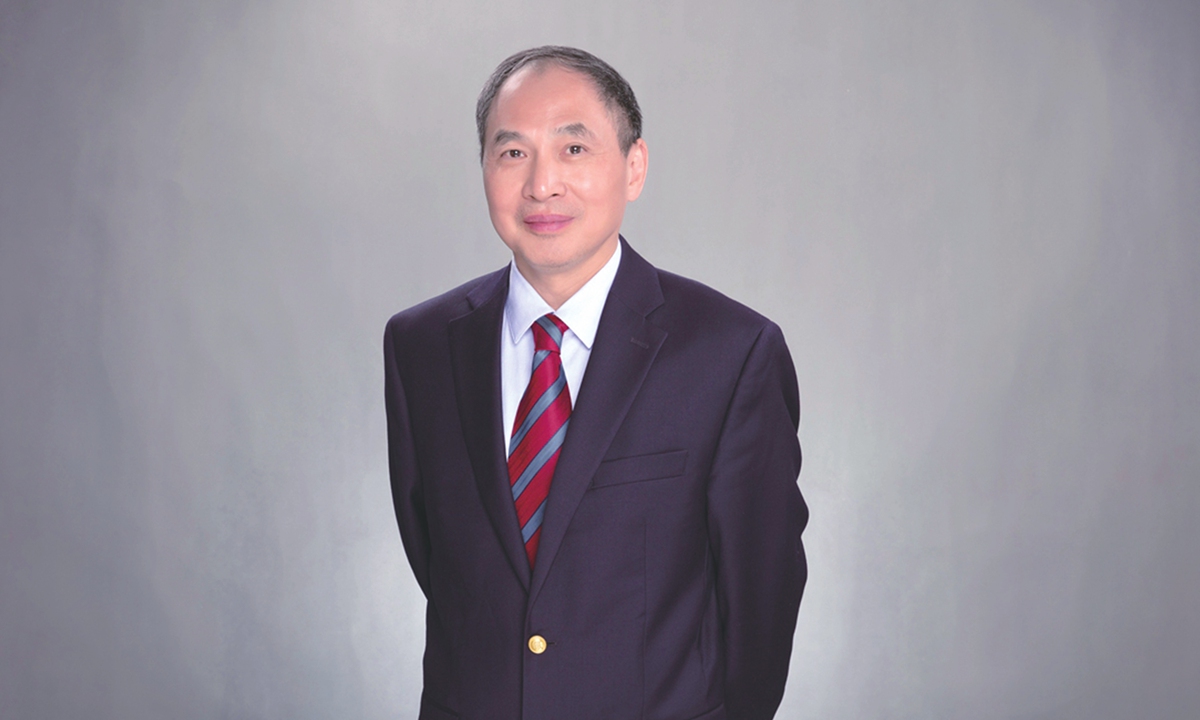
Zheng: The US' domestic affairs are the deciding factor. Previously, the Republican Party used to mainly represent the interests of the business community, while the Democratic Party stood for the interests of the workers. In terms of foreign policy, the Republican Party tended to be more conservative and tougher, while the Democratic Party had a certain "international outlook." But today, both parties have shifted their direction in foreign policy. When it comes to China-related issues and trade policy, the Republican Party is relatively rational, still considering the situation of China-US coupling. Although, former US president Donald Trump appeared irrational, he just adopted irrational approaches to achieve rational results, namely, the so-called trade balance.
By contrast, Democrats are now more ideological on trade than their Republican counterparts. Trump's pressure was to get China to bend down, while the Joe Biden administration hopes for a systematic decoupling of the US from China. Trump's moves to strangle China's high-tech sector were to prevent China from further developing in this domain, while Biden's simple ideological definition of China-US ties as "US-democracy versus Chinese autocracy" is used to weaponize and politicize trade. With the rhetoric of "recoupling" mentioned last October, Tai was not to pursue rationality in China-US trade ties. She made such remarks because the US needed China's supply chain at that time due to its poor handling of the COVID-19 pandemic.
If a country only looks at problems from the perspective of ideology, it will arouse collective panic. When one country has a sense of collective fear toward another, its decision-making will never be rational. The Biden administration goes too far on the Taiwan question and the construction of a mini NATO in Asia. Such irrationality has also driven the collective irrationality of US' allies. The word "crowd" was used in 1895 by Gustave Le Bon, a French author, to describe mass movements. This term can also be applied to international relations. On the Ukraine crisis, Russia is targeted as well as China. A "crowd psychology" emerges at the international level.
GT: Today, only threats are left in the narrative toward China from US politicians. US elites, including politicians, officials and media celebrities are supposed to help foster the public's correct perception and understanding of China. But unfortunately, it seems they are competing for who is tougher on China, leading to further confrontation between China and the US. What is your take on this?
Zheng: The collective panic is not just among the US elite, but the entire population. A recent survey of the Pew Research Center shows that over 80 percent of Americans have unfavorable views of China. What led to this result? This is a result of interactions between politicians and so-called public intellectuals. The US has always said that its media are independent and its academics are even more independent. But now it seems that this is not the case at all. The whole country has become politicized regarding China. How many people in the US can now criticize its government's China policy? If one stands up, he or she will become a public enemy.
This is the evolution of democracy. At the initial stage, Western democracy was elitist, and it remained the same after the advent of mass media. The views of elites were used to influence society through mass media until the emergence of internet and social media. Against the background in which everyone has their own media platforms, the system has changed from what was "democracy" in principle to what is now "populism." Elite democracy has shifted into a populist democracy and the US is encountering a huge challenge. The deterioration of US democracy has been immediately mirrored in its foreign policy. Now there is no possibility of having another Henry Kissinger who could create an environment in which we could communicate, and everything was transparent and without secrets.
Today, if diplomacy becomes democracy, then there is no diplomacy.
This is the danger of the world. In this context, a world order is difficult to establish. Prior US diplomacy was very professional, but now it is not only ideological and partisan, but also populist. In the Russia-Ukraine conflict, US' populism is on display on social media. There is a famous saying in the US: All politics is local. Now we can add another one: All diplomacy is local. Diplomacy must be international, with a worldview, but in the opinion of US lawmakers and politicians, the US is the world. There are no more figures from the elites like Kissinger. While the US views the world from local interests and perspectives, how can it remain as the world leader?
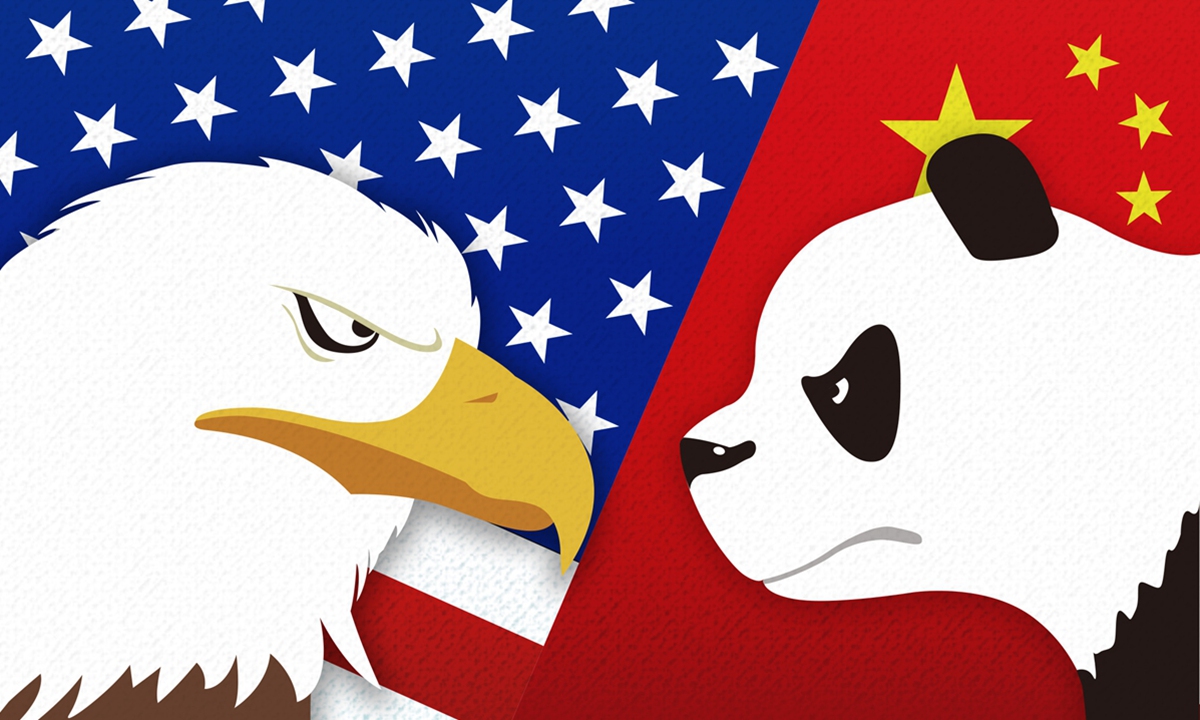
Zheng: To improve China-US relations, there are no conditions from the perspective of US domestic affairs. However, today's China-US ties are not unilaterally defined by the US, and China must be confident to define this relationship in its own terms. The US has a collective sense of fear toward China, if China generates an identical sentiment toward the US, the world will be in trouble. If China is rational, it can manage and control the conflicts. It is difficult for China to ask the US to do anything but it can insist on its own rationality. If there is a mutual collective fear, religious antagonism will appear as a result. The Biden administration wants to reorganize globalization, establish values-based blocs and democratic trade alliances. In this context, China should be more open and not escalate, from an ideological war to a "religious war," between China and the US. China must stay strategically patient.
Historically, when the US was doing well at home, its diplomacy tended to be rational. When there were a lot of domestic problems, it would divert its conflicts to international relations. The present China-US relationship is such a victim. US elites are also aware that the deterioration of China-US relations and the trade war it launched against China have failed to solve the domestic problems of the US to any extent. Even if the US fully decouples from China, as the Biden administration has planned, its problems will only worsen rather than improve.
In recent years, Washington has not rationally analyzed how much China has contributed to stabilizing the US and world economies. Instead, Washington has demonized China, saying that China has "stolen" US' technology. But the US has never thought about how much money its corporations have made from China that they could use to promote its technological upgrade as they applied their low-end technology in China. Without such a division of labor, the US would not have grown at such a rapid pace. Globalization has created a lot of wealth for the US, while the problems lie in its governance and wealth distribution.
The US has changed from a middle-class society it was proud of into the current plutocracy. Was this caused by China, or was it triggered by the US itself? The country has never reflected. As a result, when China formulates its US policy, it cannot be moved by sentiments. Instead, it has to consider what is happening inside American politics and inside American society. Otherwise, the US would simply define bilateral ties as competitive, which China should disagree with because they still have to cooperate on fields such as climate change and nuclear non-proliferation.
Why is there a big problem with the world order today? This is because we do not have enough international public goods. It is not that we do not have the capacity to provide, but because the great powers have not cooperated enough. We are producing too many international public bads, such as climate change, nuclear proliferation and public health crises. How to reduce them? Only by cooperation.
GT: After Biden took office, the Chinese and American heads of state have held several video and phone talks, but there is little sign from the US of improving relations. Washington draws allies to confront China and anti-China lawmakers increased the frequency and strength of stepping on red line of the Taiwan question. Where do you think the bottom line of US policy toward China lies? Does the US' dangerous Taiwan policy have a brake mechanism?
Zheng: No. When the entire political structure and society of the US are collectively panicking about China, there will be no rational policy and no bottom line. If anyone still fantasizes about the US having a bottom line, then we are going to make a big mistake.
There is an old saying in the West: Absolute power leads to absolute corruption. This is reflected in the US policy toward Taiwan. The US has no bottom line on the Taiwan question. Even if China draws a red line for the US, it will turn a blind eye unless China gives it a punch. Therefore, we must be fully prepared on the Taiwan question.
On Russia, NATO will not stop expanding. Gorbachev, Yeltsin and even Putin once thought of joining NATO, but what happened then? The same goes for the Taiwan question.
No one believes the US will defend Taiwan. Are the US and NATO defending Ukraine? Ukraine is just a proxy with which they want to bring down Russia. The current Russia-Ukraine conflict is not between Russia and Ukraine but between NATO and Russia. Taiwan is the same. The plan of the Cold War and anti-China factions in the US is to interrupt China's modernization process at the cost of Taiwan. Only those irresponsible Taiwan politicians who embolden themselves will believe that the US will defend Taiwan.
How to solve the Taiwan question? The US is enticing China to use military means to solve the Taiwan question. Just as the US needs a war in Ukraine to weaken Russia, it needs a conflict to create a mini NATO in Asia. We must remain highly sober-minded.
GT: Some Chinese are worried that the US wants to create an "Asian Ukraine" and use it to exhaust China and mess up Asia. This "Asian Ukraine" may be Taiwan island, Japan or South Korea. What do you think?
Zheng: The root cause of the current Russia-Ukraine conflict is NATO. The alliance claims to be the personification of justice but Putin would not have launched actions against Ukraine if Russia had not felt extremely insecure as a result of NATO's expansion into Russia's doorstep. Now, the West puts the blame on Putin, but even without him, another Russian leader will emerge to make Russia feel safe.
The US obviously wants to create an Asian NATO, through bilateral alliances, the trilateral AUKUS deal, the Quad, and the Five Eyes alliance, which are actually all aimed at China. Now it depends on how the Asian countries and regions choose. It is understandable that small countries feel insecure around big countries and develop relations with nations outside the region. But when small countries and external powers pose a threat to this big country, small countries have no security at all.
Asian countries need to think about whether Asia's security should be achieved by relying on foreign powers or by establishing an order within Asia itself. Europe has already provided lessons. The EU is a security force in Europe but NATO is not. Europe would be more peaceful if it had only the EU and no NATO as the alliance is dominated by the US. It is debatable whether it caused peace or war in Europe. The negative effects of the Russia-Ukraine conflict this time have to be borne by European countries themselves, not the US. Asian countries should see clearly. If an Asian NATO really comes into being, there will never be peace in Asia. How Asian countries build an Asian community with a shared future is very important.
GT: Economic and trade relations have been considered the ballast of China-US relations. The interdependence between China and the US is also the main reason why some believe that the Cold War cannot be repeated. Do you agree with this statement? Can economic and trade relations continue to play the role of ballast for future China-US relations?
Zheng: Whether the US tries to decouple with China or engages in cut-throat competition, it will reduce the degree of interdependence in China-US relations, but globalization cannot be stopped. Globalization is dominated by capital and technology and no administrative authority can prevent the spread of capital and technology. This is proven by thousands of years of world history. As long as the US and the West are still capitalist and China is open, globalization will not be fully interrupted.
So, I recently proposed that China integrate into the world for the second time. China has already applied to join the CPTPP. When the US implements an exclusive policy toward China, we should implement an inclusive policy toward the US. The US and Japan have always opposed the China-proposed Belt and Road Initiative but China will welcome them if they decide to join it someday. China is the second largest economy and it is necessary to open the door more. Promoting globalization is not only good for China but also for the world.
GT: US Secretary of State Antony Blinken was scheduled to outline the US' China strategy, which was postponed as he tested positive for COVID-19. Do you see any new elements in it?
Zheng: I do not think there will be anything new. During the Trump era, the US regarded China and Russia as the biggest challenges and the Biden administration only strengthens this. As I mentioned earlier, the current US policy toward China is made in a state of panic. We must look at such an irrational decision with a rational attitude.
The US may reemphasize the Indo-Pacific but in the current Russia-Ukraine conflict, India did not fully support the US. Every country has its own interests. America's fear of China has led it to embolden itself as if people all over the world are standing with it, which is not the case.
The hysteria toward China has risen to a new peak in the US. Political climate in Washington is increasingly weird in terms of China-related topics. Why is there so much irrationality on China in the US? How to view China-US relations from a constructive perspective? The Global Times (GT) interviewed several Chinese and American observers on these topics.
Zheng Yongnian (Zheng), professor at the Chinese University of Hong Kong, Shenzhen, and president of the Institute for International Affairs, Qianhai, believes that the collective panic of the US toward China has led to US' irrational China policy. When there were a lot of domestic problems, it would divert its conflicts to international relations. This is the fifth, and also the final interview, in the series.

Zheng Yongnian Photo: Courtesy of Zheng
GT: Recently, US Treasury Secretary Janet Yellen and Trade Representative Katherine Tai have repeatedly showed their hardline position toward China. In comparison, trade officials of the previous Trump administration were relatively rational even when the former president launched trade wars toward China. What is your take about US trade officials becoming hawks? Is there any rationality left in US politics?Zheng: The US' domestic affairs are the deciding factor. Previously, the Republican Party used to mainly represent the interests of the business community, while the Democratic Party stood for the interests of the workers. In terms of foreign policy, the Republican Party tended to be more conservative and tougher, while the Democratic Party had a certain "international outlook." But today, both parties have shifted their direction in foreign policy. When it comes to China-related issues and trade policy, the Republican Party is relatively rational, still considering the situation of China-US coupling. Although, former US president Donald Trump appeared irrational, he just adopted irrational approaches to achieve rational results, namely, the so-called trade balance.
By contrast, Democrats are now more ideological on trade than their Republican counterparts. Trump's pressure was to get China to bend down, while the Joe Biden administration hopes for a systematic decoupling of the US from China. Trump's moves to strangle China's high-tech sector were to prevent China from further developing in this domain, while Biden's simple ideological definition of China-US ties as "US-democracy versus Chinese autocracy" is used to weaponize and politicize trade. With the rhetoric of "recoupling" mentioned last October, Tai was not to pursue rationality in China-US trade ties. She made such remarks because the US needed China's supply chain at that time due to its poor handling of the COVID-19 pandemic.
If a country only looks at problems from the perspective of ideology, it will arouse collective panic. When one country has a sense of collective fear toward another, its decision-making will never be rational. The Biden administration goes too far on the Taiwan question and the construction of a mini NATO in Asia. Such irrationality has also driven the collective irrationality of US' allies. The word "crowd" was used in 1895 by Gustave Le Bon, a French author, to describe mass movements. This term can also be applied to international relations. On the Ukraine crisis, Russia is targeted as well as China. A "crowd psychology" emerges at the international level.
GT: Today, only threats are left in the narrative toward China from US politicians. US elites, including politicians, officials and media celebrities are supposed to help foster the public's correct perception and understanding of China. But unfortunately, it seems they are competing for who is tougher on China, leading to further confrontation between China and the US. What is your take on this?
Zheng: The collective panic is not just among the US elite, but the entire population. A recent survey of the Pew Research Center shows that over 80 percent of Americans have unfavorable views of China. What led to this result? This is a result of interactions between politicians and so-called public intellectuals. The US has always said that its media are independent and its academics are even more independent. But now it seems that this is not the case at all. The whole country has become politicized regarding China. How many people in the US can now criticize its government's China policy? If one stands up, he or she will become a public enemy.
This is the evolution of democracy. At the initial stage, Western democracy was elitist, and it remained the same after the advent of mass media. The views of elites were used to influence society through mass media until the emergence of internet and social media. Against the background in which everyone has their own media platforms, the system has changed from what was "democracy" in principle to what is now "populism." Elite democracy has shifted into a populist democracy and the US is encountering a huge challenge. The deterioration of US democracy has been immediately mirrored in its foreign policy. Now there is no possibility of having another Henry Kissinger who could create an environment in which we could communicate, and everything was transparent and without secrets.
Today, if diplomacy becomes democracy, then there is no diplomacy.
This is the danger of the world. In this context, a world order is difficult to establish. Prior US diplomacy was very professional, but now it is not only ideological and partisan, but also populist. In the Russia-Ukraine conflict, US' populism is on display on social media. There is a famous saying in the US: All politics is local. Now we can add another one: All diplomacy is local. Diplomacy must be international, with a worldview, but in the opinion of US lawmakers and politicians, the US is the world. There are no more figures from the elites like Kissinger. While the US views the world from local interests and perspectives, how can it remain as the world leader?

Illustration: Liu Rui
GT: You once mentioned that China-US ties are a "victim" of the US' domestic problems. Do you think bilateral relations between China and the US will be stabilized? In a bid to reach stability, what conditions are required?Zheng: To improve China-US relations, there are no conditions from the perspective of US domestic affairs. However, today's China-US ties are not unilaterally defined by the US, and China must be confident to define this relationship in its own terms. The US has a collective sense of fear toward China, if China generates an identical sentiment toward the US, the world will be in trouble. If China is rational, it can manage and control the conflicts. It is difficult for China to ask the US to do anything but it can insist on its own rationality. If there is a mutual collective fear, religious antagonism will appear as a result. The Biden administration wants to reorganize globalization, establish values-based blocs and democratic trade alliances. In this context, China should be more open and not escalate, from an ideological war to a "religious war," between China and the US. China must stay strategically patient.
Historically, when the US was doing well at home, its diplomacy tended to be rational. When there were a lot of domestic problems, it would divert its conflicts to international relations. The present China-US relationship is such a victim. US elites are also aware that the deterioration of China-US relations and the trade war it launched against China have failed to solve the domestic problems of the US to any extent. Even if the US fully decouples from China, as the Biden administration has planned, its problems will only worsen rather than improve.
In recent years, Washington has not rationally analyzed how much China has contributed to stabilizing the US and world economies. Instead, Washington has demonized China, saying that China has "stolen" US' technology. But the US has never thought about how much money its corporations have made from China that they could use to promote its technological upgrade as they applied their low-end technology in China. Without such a division of labor, the US would not have grown at such a rapid pace. Globalization has created a lot of wealth for the US, while the problems lie in its governance and wealth distribution.
The US has changed from a middle-class society it was proud of into the current plutocracy. Was this caused by China, or was it triggered by the US itself? The country has never reflected. As a result, when China formulates its US policy, it cannot be moved by sentiments. Instead, it has to consider what is happening inside American politics and inside American society. Otherwise, the US would simply define bilateral ties as competitive, which China should disagree with because they still have to cooperate on fields such as climate change and nuclear non-proliferation.
Why is there a big problem with the world order today? This is because we do not have enough international public goods. It is not that we do not have the capacity to provide, but because the great powers have not cooperated enough. We are producing too many international public bads, such as climate change, nuclear proliferation and public health crises. How to reduce them? Only by cooperation.
GT: After Biden took office, the Chinese and American heads of state have held several video and phone talks, but there is little sign from the US of improving relations. Washington draws allies to confront China and anti-China lawmakers increased the frequency and strength of stepping on red line of the Taiwan question. Where do you think the bottom line of US policy toward China lies? Does the US' dangerous Taiwan policy have a brake mechanism?
Zheng: No. When the entire political structure and society of the US are collectively panicking about China, there will be no rational policy and no bottom line. If anyone still fantasizes about the US having a bottom line, then we are going to make a big mistake.
There is an old saying in the West: Absolute power leads to absolute corruption. This is reflected in the US policy toward Taiwan. The US has no bottom line on the Taiwan question. Even if China draws a red line for the US, it will turn a blind eye unless China gives it a punch. Therefore, we must be fully prepared on the Taiwan question.
On Russia, NATO will not stop expanding. Gorbachev, Yeltsin and even Putin once thought of joining NATO, but what happened then? The same goes for the Taiwan question.
No one believes the US will defend Taiwan. Are the US and NATO defending Ukraine? Ukraine is just a proxy with which they want to bring down Russia. The current Russia-Ukraine conflict is not between Russia and Ukraine but between NATO and Russia. Taiwan is the same. The plan of the Cold War and anti-China factions in the US is to interrupt China's modernization process at the cost of Taiwan. Only those irresponsible Taiwan politicians who embolden themselves will believe that the US will defend Taiwan.
How to solve the Taiwan question? The US is enticing China to use military means to solve the Taiwan question. Just as the US needs a war in Ukraine to weaken Russia, it needs a conflict to create a mini NATO in Asia. We must remain highly sober-minded.
GT: Some Chinese are worried that the US wants to create an "Asian Ukraine" and use it to exhaust China and mess up Asia. This "Asian Ukraine" may be Taiwan island, Japan or South Korea. What do you think?
Zheng: The root cause of the current Russia-Ukraine conflict is NATO. The alliance claims to be the personification of justice but Putin would not have launched actions against Ukraine if Russia had not felt extremely insecure as a result of NATO's expansion into Russia's doorstep. Now, the West puts the blame on Putin, but even without him, another Russian leader will emerge to make Russia feel safe.
The US obviously wants to create an Asian NATO, through bilateral alliances, the trilateral AUKUS deal, the Quad, and the Five Eyes alliance, which are actually all aimed at China. Now it depends on how the Asian countries and regions choose. It is understandable that small countries feel insecure around big countries and develop relations with nations outside the region. But when small countries and external powers pose a threat to this big country, small countries have no security at all.
Asian countries need to think about whether Asia's security should be achieved by relying on foreign powers or by establishing an order within Asia itself. Europe has already provided lessons. The EU is a security force in Europe but NATO is not. Europe would be more peaceful if it had only the EU and no NATO as the alliance is dominated by the US. It is debatable whether it caused peace or war in Europe. The negative effects of the Russia-Ukraine conflict this time have to be borne by European countries themselves, not the US. Asian countries should see clearly. If an Asian NATO really comes into being, there will never be peace in Asia. How Asian countries build an Asian community with a shared future is very important.
GT: Economic and trade relations have been considered the ballast of China-US relations. The interdependence between China and the US is also the main reason why some believe that the Cold War cannot be repeated. Do you agree with this statement? Can economic and trade relations continue to play the role of ballast for future China-US relations?
Zheng: Whether the US tries to decouple with China or engages in cut-throat competition, it will reduce the degree of interdependence in China-US relations, but globalization cannot be stopped. Globalization is dominated by capital and technology and no administrative authority can prevent the spread of capital and technology. This is proven by thousands of years of world history. As long as the US and the West are still capitalist and China is open, globalization will not be fully interrupted.
So, I recently proposed that China integrate into the world for the second time. China has already applied to join the CPTPP. When the US implements an exclusive policy toward China, we should implement an inclusive policy toward the US. The US and Japan have always opposed the China-proposed Belt and Road Initiative but China will welcome them if they decide to join it someday. China is the second largest economy and it is necessary to open the door more. Promoting globalization is not only good for China but also for the world.
GT: US Secretary of State Antony Blinken was scheduled to outline the US' China strategy, which was postponed as he tested positive for COVID-19. Do you see any new elements in it?
Zheng: I do not think there will be anything new. During the Trump era, the US regarded China and Russia as the biggest challenges and the Biden administration only strengthens this. As I mentioned earlier, the current US policy toward China is made in a state of panic. We must look at such an irrational decision with a rational attitude.
The US may reemphasize the Indo-Pacific but in the current Russia-Ukraine conflict, India did not fully support the US. Every country has its own interests. America's fear of China has led it to embolden itself as if people all over the world are standing with it, which is not the case.
